The Power of Partnership: Reflecting on Community Engagement with “Stop the Raids!”
In 2007, Charlie Fuentes ‘08 founded “Stop the Raids!” as a student organization at Trinity College. The group, which protested federal raids against undocumented immigrants, offers a powerful example of how students’ co-curricular efforts in partnership with Hartford residents can leave a lasting mark. In addition to mobilizing large groups of students to fight for immigrant rights, “Stop the Raids!” collaborated with Hartford organizations that played a role in passing Hartford’s sanctuary city ordinance in 2008. In Fall 2021, current Community Action Gateway students examined the work of “Stop the Raids!” as they learned about the opportunities and challenges of higher education community engagement and social change. Though the “Stop the Raids!” group is no longer active at Trinity, the rights of undocumented immigrants are still a salient issue in the Hartford community and touch members of the Trinity College community today.
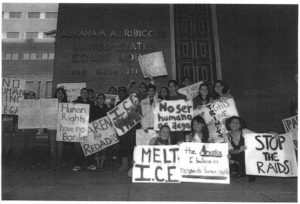
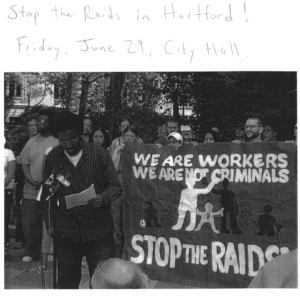
In 2007 when “Stop the Raids!” was founded, Connecticut was experiencing ICE raids against undocumented immigrants. As an immigrant himself, Fuentes learned about the Danbury 11 campaign to assist eleven day laborers in Danbury, CT who were seized by ICE. To protest their seizure, “Stop the Raids!” collaborated with La Voz Latina and Temple of Hip Hop, gaining a membership of nearly 50 students. Students joined Hartford organizations in bringing handmade signs and making speeches at protests in Hartford. At one protest at the U.S. District Court in Hartford, Charlie Fuentes made a speech saying, “An attack on an immigrant worker is an attack on an American worker” (Read more about that rally here).
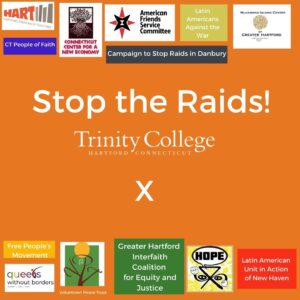
Fuentes first connected with the Hartford community while working at Trinfo Café. He then used the connections made there to advance his work with “Stop the Raids!” With a coalition of organizations, “Stop the Raids!” advocated for a “Don’t ask, don’t arrest” law in Hartford which prohibited police officers from asking people their status. The group attended forums in Hartford regarding the new law, made announcements, and spread the word at Temple of Hip Hop performances. They also showed documentaries about undocumented people’s stories, invited members of the Danbury 11 to come speak at Trinity, and hosted local artists like Marela Zacarias and David Bacon who created art on the topic of ICE raids.
After Fuentes graduated in 2008, “Stop the Raids!” was continued by several students, including Daniella Ortiz. In March 2011, “Stop the Raids!” continued their work by helping to plan a protest in support of Mariano Cardoso, an undocumented college student who was arrested by ICE without a warrant at a family BBQ.
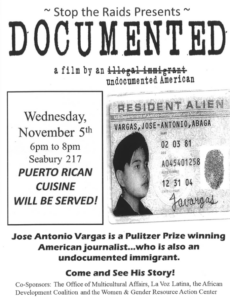
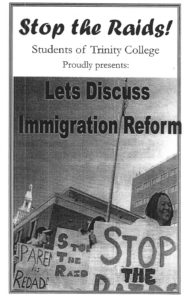
Stop the Raids is no longer an active student group at Trinity, but in Fall 2021 Community Action Gateway students looked back at its legacy. Mina Arnella ‘25 and Shayla Whitaker ‘25 interviewed Fuentes, who is now a teacher. During the interview, Fuentes reflected on his commitment to taking action and the things he learned about making a difference during his time as a student. He explained that although he was a Latino immigrant, he was at Trinity College and had a level of privilege that he could tap into to uplift and provide a platform for the surrounding Latino community. His commitment was strong as a student, and he recognized his privilege of time. He used that time to drive between Hartford and Danbury and to build trust with the other protesters and activists involved in the local movement. However, he also noted the reality that Trinity students leave in the summer and cannot necessarily be depended on by the Hartford community for long-term engagement. Fuentes also shared about the challenge of not seeing a direct impact from his efforts with “Stop the Raids!”, but reflected on how the members of Frog Hollow were grateful for and surprised by the students presence in the protests at the time.
After studying the efforts of “Stop the Raids!”, interviewing Fuentes, and considering their classroom learning on ethical community engagement, Arnella and Whitaker concluded that it was a powerful example of meaningful student community engagement. “Stop the Raids!” serves as an example for other academic community engagement programs to follow and learn from. The students involved recognized their positionality by understanding their privilege and the root causes of social injustice. This all has led to the building of a mutually beneficial relationship for the community and ‘Stop the Raids!’” Whitaker reflected.
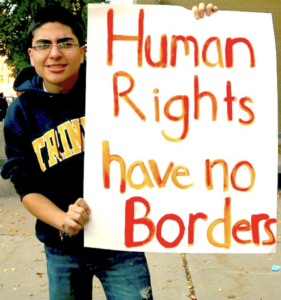
Student activist groups like “Stop the Raids!” can serve as an example of collaborative community action and engagement. “Stop the Raids!” responded to a moment and a need of the community. Fuentes and the group did not organize with preconceptions of what the community needed, but joined in to make the community’s efforts stronger and more seen.
This work is still relevant and could be continued at Trinity. As Fuentes reflected, this work needs to be long-term to be impactful and will ideally continue beyond the semester schedule of the College. Undocumented immigrants continue to face injustices in Hartford. In revisiting the history and impact of “Stop the Raids!”, the Trinity community can be reminded of concrete steps to move forward with its community engagement with Hartford.
Echoing the work of “Stop the Raids!”, on March 3, 2022, students joined the National Day of Action demanding the Biden Administration shut down immigrant detention centers, free all who are detained, stop deportations, and cut ICE and CBP’s budget. The Nest Artists, a Trinity student organization led by Tiana Sharpe ‘23, held a poster making event at the Underground Coffee House to contribute to a Hartford protest. Hartford organizations led and gathered other community members at the United States District Court in Hartford and peacefully voiced demands. A few Trinity College students attended, and many Hartford community members held the signs which Trinity students made.
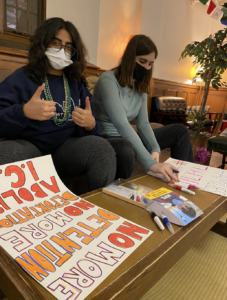

Trinity students could continue this work, as Fuentes did, showing up for Hartford immigrants. Students interested in learning more about continuing this work can contact Joe Barber at [email protected].
